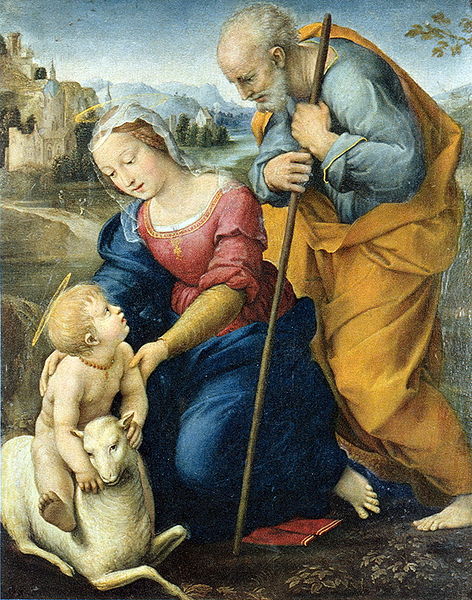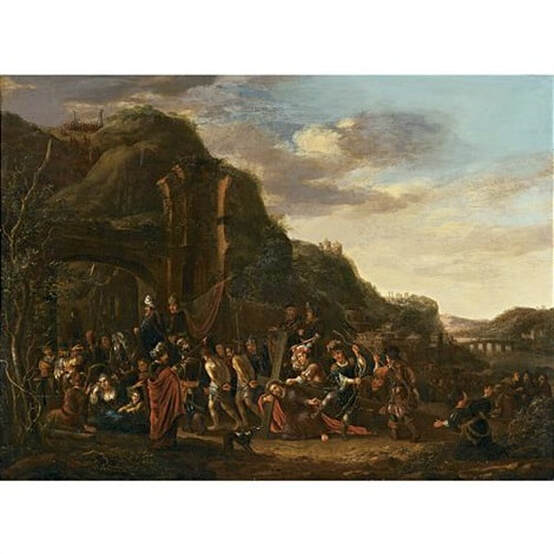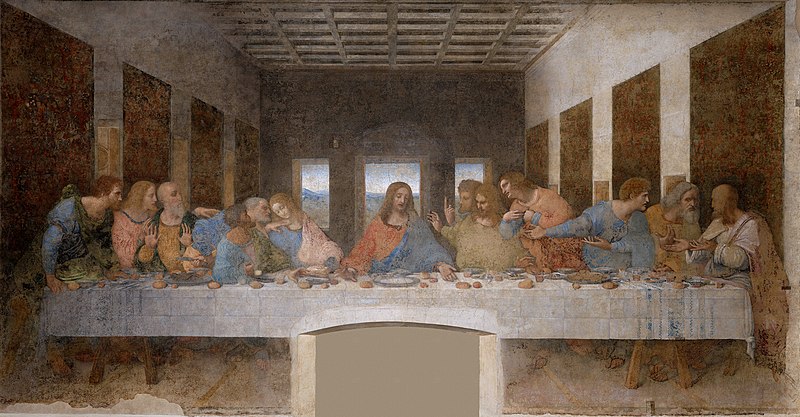|
Smile Down from Raphael’s Canvas, Lamb of Wrath (January 1937) Улыбнись, ягненок гневный с Рафаэлева холста, - На холсте уста вселенной, но она уже не та... В легком воздухе свирели раствори жемчужин боль В синий, синий цвет синели океана въелась соль... Цвет воздушного разбоя и пещерной густоты, Складки бурного покоя на коленях разлиты. На скале черствее хлеба - молодых тростинки рощ, И плывет углами неба восхитительная мощь. ** Smile down from Raphael’s canvas, lamb of wrath, that canvas the lips of a cosmos that’s not what it was. In the pipes’ light air, let the pain of pearls diffuse as the salt gnaws at the ocean’s bluest of blues. There are sapling groves on cliffs that are drier than bread, and the stormy calm that creases your knees has spread; the colour ransacked from the air, with a cavern’s depth, about its angles sails the sky’s exquisite strength. Osip Mandelstam, translated by Alistair Noon Author's note: Opinions vary on exactly which of Raphael's various pictures of the Madonna and child this poem directly responds to The Holy Family with a Lamb of 1507, now in the Prado in Madrid, was suggested in the memoirs of Natasha Shtempel, a teacher who befriended and supported the poet and his wife Nadezhda. Like Rembrandt, Fine Chiaroscuro Martyr (February 1937) Как светотени мученик Рембрандт, Я глубоко ушел в немеющее время, И резкость моего горящего ребра Не охраняется ни сторожами теми, Ни этим воином, что под грозою спят. Простишь ли ты меня, великолепный брат, И мастер, и отец черно-зеленой теми, - Но око соколиного пера И жаркие ларцы у полночи в гареме Смущают не к добру, смущают без добра Мехами сумрака взволнованное племя. ** Like Rembrandt, fine chiaroscuro martyr, I’ve fallen on times of faltering speech. Neither these soldiers nor this guard the thunder above has abandoned to sleep will keep my burning rib this sharp. Forgive me, magnificent brother, the father of darkness, its shades of blackening green, but the eye in the falcon’s wing, old master, and the midnight harem’s gleaming caskets trouble the tribe that the dusk has alarmed with its skins, for the worse, and no kindness is seen. Osip Mandelstam, translated by Alistair Noon Author's note: At the time of the poem’s writing, the painting was on display in the Voronezh art museum and was attributed to Rembrandt, but it has since been identified as the work of Rembrandt’s contemporary, Jacob Willemszoon de Wet the Elder. That Supper Fell for the Wall (March 1937) Небо вечери в стену влюбилось - Всё изрублено светом рубцов, - Провалилось в нее, осветилось, Превратилось в тринадцать голов. Вот оно - мое небо ночное, Пред которым как мальчик стою: Холодеет спина, очи ноют, Стенобитную твердь я ловлю - И под каждым ударом тарана Осыпаются звезды без глав: Той же росписи новые раны - Неоконченной вечности мгла... ** That Supper fell for the wall and vanished inside it, grew brighter, grew thirteen heads: it was all a great chipping and chopping of light. Here it is then, my night sky, and before it I’m poised like a boy whose back runs cold, sore-eyed. I catch this vault that deploys the untiring thuds of its ram to mete out that fresco’s new wounds: headless stars crumbling off in the span of the lasting and unfinished gloom. Osip Mandelstam, translated by Alistair Noon Author's note: The poem refers to Leonardo da Vinci’s Last Supper in the refectory of Santa Maria delle Grazie, a convent in Milan. Due to environmental conditions, the mural began deteriorating immediately after completion and has been the subject of conservation work over the centuries, not all of it helpful. In 1652, while the mural was no longer visible, a doorway was constructed through its lower part. Osip Mandelstam (1891-1938) spent three years in internal exile in the central Russian city of Voronezh together with his wife, Nadezhda Mandelstam. He would often visit the city's art museum and wrote several ekphrastic pieces, drawing not only on famous paintings as here but also Greek pottery art and a contemporary fresco. He died in the Gulag. Alistair Noon's translations of Osip Mandelstam (Concert at a Railway Station: Selected Poems) appeared from Shearsman Books in 2018. His own poetry has appeared in two collections (Earth Records and The Kerosene Singing) from Nine Arches Press, plus a dozen chapbooks from various small presses, most recently QUAD (Longbarrow, 2017). He lives in Berlin.
0 Comments
Your comment will be posted after it is approved.
Leave a Reply. |
The Ekphrastic Review
COOKIES/PRIVACY
This site uses cookies to deliver your best navigation experience this time and next. Continuing here means you consent to cookies. Thank you. Join us on Facebook:
July 2024
|






